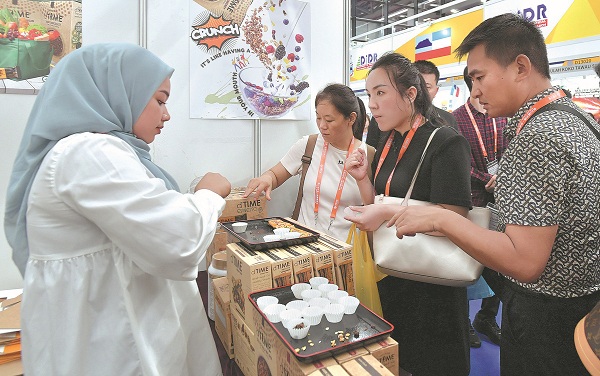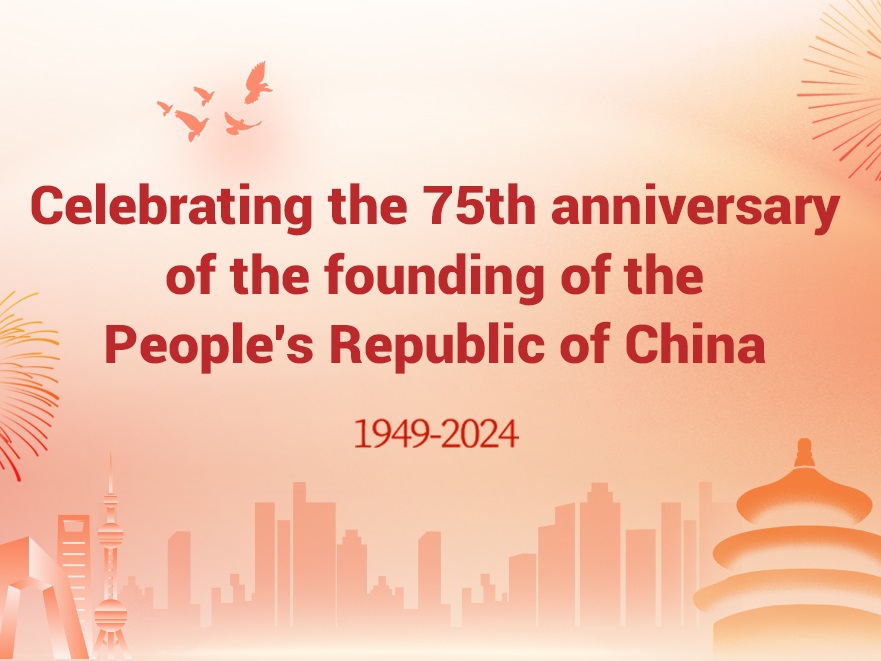China, ASEAN target institutional opening-up

Visitors savor Philippine food at the China-ASEAN Expo in Nanning, Guangxi Zhuang autonomous region. PENG HUAN/FOR CHINA DAILY
Shorter negative list for investment, upgraded FTA may bolster trade ties
With economic cooperation between China and the Association of Southeast Asian Nations strengthening toward a higher level, all parties concerned are expected to embrace institutional opening-up in order to co-create a new future for regional development, officials and experts said during the ongoing China-ASEAN Expo in Nanning, capital of the Guangxi Zhuang autonomous region.
"This year marks the 20th anniversary of the China-ASEAN Expo, or CAEXPO, as well as the establishment of the China-ASEAN strategic partnership. With high-standard opening-up bringing new opportunities, trade and economic cooperation between both sides has seen rapid improvement," said Li Fei, China's vice-minister of commerce, during a thematic event on the expo's sidelines.
"Both sides have become each other's largest trading partner, with cumulative two-way investment being boosted and upgraded," he said.
He further said that in the next step, the country will make efforts to steadily boost institutional opening-up, by further reducing the negative list for foreign investment, and paying attention to trade in both traditional industries like agriculture and emerging fields like green and low-carbon development and the digital economy.
Against the backdrop of a bleak global economic rebound, the cooperation between China and ASEAN has become a bright spot, he said.
Kao Kim Hourn, secretary-general of ASEAN, said the robust growth of ASEAN and China comes from the two sides' ability to adapt to global instability and uncertainty. In response to unprecedented challenges during the COVID-19 pandemic, the two sides chose to reinforce efforts for free, fair and open trade whereas some countries resorted to inward-looking and protectionist policies.
To make the most of the economic partnership between ASEAN and China and drive regional economic growth, a high-quality ASEAN China Free Trade Area (ACFTA 3.0) is needed as part of efforts for institutional opening-up, he said.
China has been ASEAN's largest trading partner since 2009, with trade volumes increasing over the years. Last year, bilateral trade value reached $975.3 billion. The ASEAN-China Free Trade Area has contributed to the expansion of trade and investment, benefiting both sides. Negotiations for ACFTA 3.0 were officially launched early this year to further liberalize and facilitate bilateral trade flows.
He said that promoting China-ASEAN infrastructure connectivity is important as well. "This connectivity not only facilitates the movement of goods and services but sparks innovation and the exchange of ideas."
The China-ASEAN partnership is a great example of strengthening multilateral cooperation without leaning toward protectionism, unilateralism or economic nationalism, the officials said.
Given the complex economic and geopolitical situation globally, the two sides, as members of the Regional Comprehensive Economic Partnership, should further strengthen economic and trade ties, to contribute to quicker recovery from the pandemic as well as international conflicts, they said.
Suriyan Vichitlekarn, executive director of the Mekong Institute, an intergovernmental organization run by six governments in the Greater Mekong sub-region (China, Cambodia, Laos, Myanmar, Thailand and Vietnam), said: "The progress of the ASEAN-China cooperation will produce more far-reaching effects and benefits to others. Look at the logistics and trade corridor — although its focus is very much on China and ASEAN ... however, if you look at the map of Asia, this logistical hub could also benefit other countries in South Asia, the Pacific and the southern hemisphere."
At the four-day CAEXPO that began on Sunday, various exhibitors are showcasing their latest achievements in digitalization and low-carbon development. The unmanned dessert station of Yum China's KFC uses a robotic arm to produce ice cream for consumers within 40 to 50 seconds. The electric and intelligent products displayed by Guangxi Liugong Machinery account for over 70 percent of its total exhibits.


